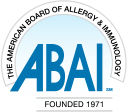About ABAI
History
The ABAI was established in 1971 as a Conjoint Board of the ABIM and ABP. The internal medicine subspecialty existed from 1936-1971 and the pediatric subspecialty existed from 1944-1971. The ABAI is committed to working closely with its parent boards to maintain the highest educational and clinical standards in the specialty of allergy/immunology.
Beginning in 1989, new ABAI Diplomates receive certificates valid for ten years. Time unlimited certificates were issued prior to 1989. As of 2009, ABAI transitioned from recertification to a continuous Maintenance of Certification program in accordance with ABMS MOC® guidelines. MOC is a voluntary process for time-unlimited certificate holders. Medical specialty certification in the United States is a voluntary process that demonstrates a physician's exceptional expertise in a particular specialty of medical practice.
The ABAI currently has 7,282 Diplomates who are board-certified in Allergy and Immunology. Please refer to ABAI statistics for further details.
Mission
The ABAI mission is to:
- Improve the quality of medical care by the development and utilization of professional and educational standards for the inital certification and Maintenance of Certification of physician specialists in allergy/immunology;
- Provide assurance to the public that a physician specialist certified in allergy/immunology has successfully completed an approved educational program and evaluation process which includes componenets designed to assess the medical knowledge, judgment, professionalism and clinical (and communication) skills required to provide quality patient care in allergy/immunology;
- Serve the public and the health care community by providing the names of physicians certified by the ABAI as allergists/immunologists and those who are and are not participating in the Maintenance of Certification program;
- Establish standards for training programs in allergy/immunology working with the Residency Review Committee for Allergy and Immunology of the Accreditation Council for Graduate Medical Education (ACGME);
- Maintain records of ABAI certified allergist/immunologists and records of Maintenance of Certification.
ABAI does not recommend specialists, offer advice on allergic/immunologic medical problems, or provide fee schedules for specific services. Contact the American Medical Association instead.
ABAI does not sponsor or maintain any records on any courses which claim to be review courses in preparation for its examinations, nor does it offer or endorse any specific publication or courses to prepare for its examinations. For more information on the ABAI examinations, see the Examination section.
American Board of Medical Specialties
The ABAI was established in 1971 as one of the 24 medical specialty boards (Member Boards) that make up the American Board of Medical Specialties (ABMS). Through ABMS, the boards work together to set and sustain common standards of expertise and professionalism that each uses to evaluate candidates for board certification and specialists to maintain their certification. Medical specialty certification is the largest standard-setting and assessment process established and maintained by a profession.
ABMS and the Member Boards are all independent non-profit organizations and establish their processes and standards free of any professional or governmental body and they do not receive funds from industry. The Member Boards maintain their own board of directors, elected from within the specialty and the public. These leaders and others from the Member Boards and the public make up the ABMS Board of Directors and Assembly. They represent working and retired individuals from across the country with a broad range of experience in patient care, health administration, education, business, community service, regulatory policy and international affairs.
ABMS also provides information concerning specialist certification gathered from its Member Boards for the benefit of the public, government, professional and other stakeholders.
The Member Boards work collectively to set standard benchmarks of knowledge and professionalism for providing care in a particular area of medicine.
- Being the authoritative resource/clearinghouse and voice/forum for issues surrounding physician certification as it relates to the provision of quality healthcare
- Establishing and maintaining the mechanism for recognizing quality in certification and maintenance of certification programs
- Promoting research activities to advance knowledge regarding physician certification
- Providing information and quality services for certification verification
